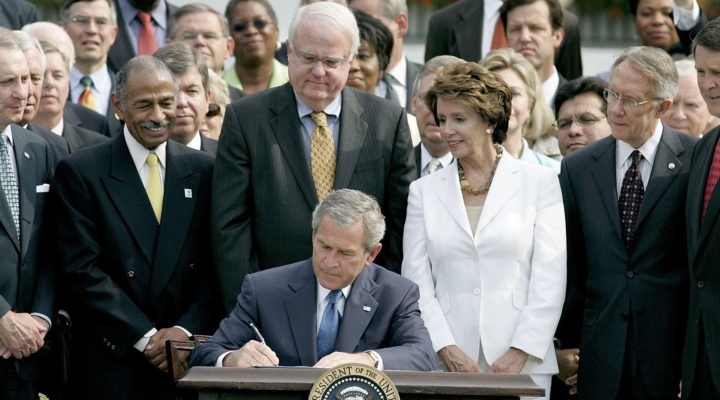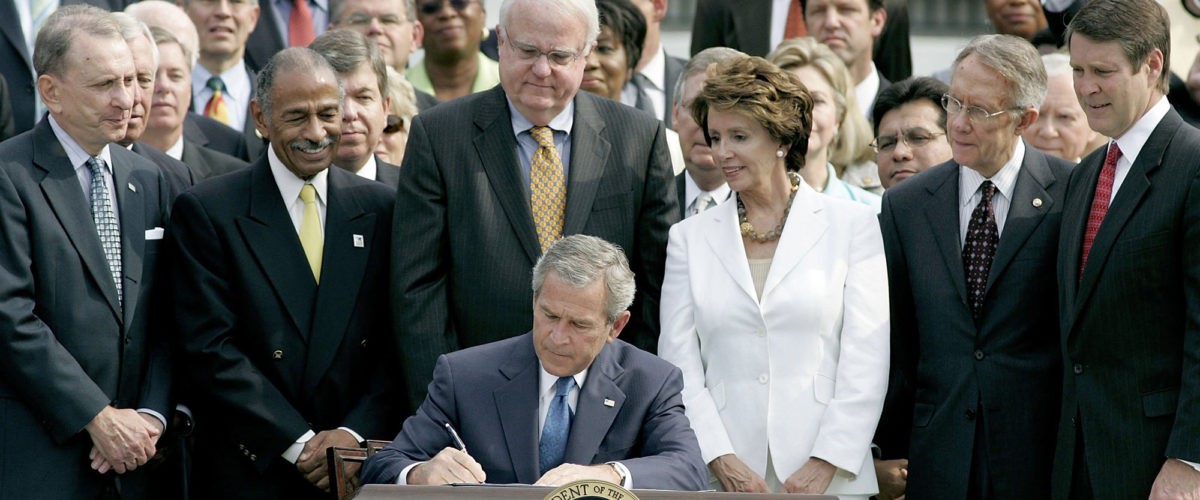It shouldn’t feel so hard to write about voting rights in a way that will not offend partisan sensibilities. It didn’t used to be this way. In 2006, Congress reauthorized the 1965 Voting Rights Act with a unanimous vote in the Senate, 98-0. It was promptly signed into law by President George W. Bush, who did so in honor of Fanny Lou Hamer, Rosa Parks and Coretta Scott King, with Jesse Jackson and Al Sharpton in attendance.
Sadly, much has changed in the last 15 years, and such bipartisan cooperation seems like another era.
While the task is difficult, I cannot let my desire to avoid accusations of partisanship overcome the need to speak truth and advocate for justice as I see it.
‘One person, one vote’
“One person, one vote” is the ideal that forms the bedrock of our democracy. It aligns with the fundamental Christian belief that all people are created in God’s image and are therefore equal. It is one of the reasons I am a Baptist.
“’One person, one vote’ is the ideal that forms the bedrock of our democracy.”
Our congregational polity means each church member is empowered to vote on important matters of church life and governance. In our country, each citizen should be empowered to have their voice contribute equally to determine who represents us and how our government operates. A government by, for and of the people.
Of course, whether or not each voice is valued and given equal weight never has been a settled question. The vote has been the subject of conflict and debate throughout U.S. history. Originally, it was reserved for landowning white men, and Black slaves counted as only 3/5 of a person when considering Congressional representation. While the 15th Amendment gave Black males the right to vote, that right was rarely protected. Eventually, and after a sustained movement, women were given the vote in 1920. Less than 60 years ago, the Voting Rights Act finally put the weight of the federal government behind the promise of Black suffrage. Although in application, that fight continues.
The Voting Rights Act of 1965 set up a process of federal approval for changes to voting laws in states with a history of discrimination. Those “pre-clearance” provisions were undone by the Shelby v. Holder Supreme Court ruling in 2013. Proposed changes to voting laws have picked up pace since then.
Must this be a partisan fight?
According to experts at the Brennan Center for Justice, as of March 24, 361 bills with restrictive voting provisions have been filed in 47 state legislatures this session. Fortunately, 843 bills have been filed to make voting access more expansive.
These dueling proposals demonstrate the partisan nature of this fight. Whether it is non-citizens, dead voters or Russian hackers, both parties should be committed to free, fair and secure elections. Faith in democracy is heightened when people believe their voice is counted and valued.
“Both parties should be committed to free, fair and secure elections.”
We should make it as easy as possible for every eligible voter to register and vote. Free and fair elections should mean each person is able to exercise their right to vote with few barriers and in a manner that ensures security. Any bill that restricts access and makes it more difficult for some to participate should provide rock-solid evidence of a problem and explain how the bill addresses it. Unsubstantiated accusations and hypotheticals are not enough, especially in light of our history.
Despite our partisan reality, recent polling shows broad agreement among the public on several measures that would make voting easier. Seventy-eight percent of Americans think early in-person voting should be available for at least two weeks before an election; 68% believe Election Day should be a national holiday; and 61% believe everyone eligible should be automatically registered to vote.
Georgia and Texas
In many states, the law is moving in the opposite direction. Georgia and Texas are two states garnering substantial attention.
The law recently passed in Georgia was not as extreme as some of the proposed provisions, but it is problematic. Under the new law, there will be less time to request absentee ballots, fewer drop boxes with less accessible hours, local officials can no longer mail absentee ballot applications to all voters, and voters have half as long to request absentee ballots. The law also bans mobile voting sites, (polling places on wheels.) Such sites have been used only by Fulton County, which has the largest Black population in the state.
The most notorious change is the criminalization of passing out food and water to those waiting in line to vote. Why would anyone want to make it harder to stand in line to vote unless there was substantial evidence that handing out free pizza and water bottles was buying votes?
“A better question might be, why are people having to stand in line so long that they need sustenance?”
A better question might be, why are people having to stand in line so long that they need sustenance? The provision is more nefarious when the same law contains a mechanism for the state to take over elections from local officials. Will lines intentionally be made longer in particular counties or precincts, which will deter or suppress certain voters?
In Texas, 49 bills have been filed to restrict voting access or make voting more difficult. The two making their way through the legislature right now are SB7 and HB6. These bills would restrict the freedom of local communities to expand early voting and would make voter intimidation much more likely and difficult to stop. They also make it more difficult for those with disabilities to receive help voting.
During the presidential election of 2020, Harris County, which includes the incredibly diverse city of Houston, utilized 24-hour early voting locations and drive-through voting, which helped increase turnout by 10%. Voters of color made up more than half those who took advantage of these polling places. Although there has been no credible evidence of increased fraud, both these options would be outlawed by SB7. One can reasonably wonder if high turnout and minority participation are the “problems” these bills seek to solve.
About voter fraud
Proponents justify these provisions and others by a stated need to prevent voter fraud. At best, such provisions could limit hypothetical voter fraud schemes. They are not responses to proven instances of voter fraud and will certainly make it more difficult for some to vote.
Independent analysis shows voter fraud in Texas this century is extremely rare: only 174 people have been prosecuted out of 94 million votes cast since 2005. The Brennan Center has a comprehensive list of studies that show similar results, including studies from Arizona State University, which show 10 cases of voter impersonation fraud nationwide from 2000 to 2012. According to a Houston Chronicle investigation conducted just two weeks ago, there are 43 people with pending voter fraud charges with the Texas attorney general’s office. Only one of those is from the 2020 election in which more than 11 million votes were cast.
“While voter fraud itself is almost nonexistent, … the term is frequently used in political debate.”
While voter fraud itself is almost nonexistent, and thus does not affect election outcomes, the term is frequently used in political debate. A recent Houston Chronicle editorial outlined an extensive history of racially motivated voting restrictions. In each case — all-white primaries, poll taxes, re-registration and voter purges — the stated justification of these clearly discriminatory laws was the same, to prevent voter fraud.
Voter fraud is exceedingly rare, and rather than impacting the outcome of our elections, it most often is used as the pretext for racially discriminatory and restrictive voting laws. We are therefore facing a conflict between fictitious, hypothetical fraud, and an undeniable history of racial discrimination.
No doubt the increase in bills that limit voting access or institute new restrictions are based in part on the widespread and entirely unsubstantiated allegations of massive voter fraud following the last presidential election. Rather than rebut conspiracies, I’ll only point out that those who so fervently claimed fraud and promoted the allegations are now in court defending themselves from civil defamation lawsuits. Their most common defense — no reasonable person would believe such claims. It was nothing more than political hyperbole.
Unfortunately, their made-up lies have real-world consequences. These claims, debunked in more than 60 courts, have become the basis of public policy.
The authors of such bills claim they are necessary because public faith in our elections has been shaken. But the same politicians who sowed seeds of doubt cannot now use that doubt as an excuse for new voting restrictions. People believe lies about the election because they keep telling them. Public policy should not be based on lies.
It is not surprising that politicians and parties want to protect their power, but we also should expect them to uphold democratic ideals when attempting to do so.
Do corporations have better morals than churches?
The corporate reaction to the new law in Georgia and proposed bills in Texas has been swift. I commend the computer CEOs and airline executives who have spoken up for democracy and in defense of historically marginalized voters.
“Do we now expect more moral leadership from corporations than church leaders just so we don’t offend the diehard partisans in our pews?”
Shouldn’t pastors and other people of faith do the same? Do we now expect more moral leadership from corporations than church leaders just so we don’t offend the diehard partisans in our pews? I know it is not easy. I’ve been quiet for too long and done too little myself. I’m grateful for the pastors and people of faith who have spoken out, and I encourage you to join them.
Christians concerned about the common good, those trying to follow Jesus in his mission to free the oppressed, those who want to “do justice,” must be willing to engage. When it comes to voting, we should give particular deference to and speak up alongside those who find it harder to vote — neighbors who work overnight shifts or multiple jobs to support their families, those with disabilities, and those without reliable transportation or child care.
We should hold those promoting changes to voting laws to a high standard. Suspicion from minority communities is well-earned, based in historical fact and justified.
Police violence against Black Americans has caused an awakening among many white Christians to the reality of systemic racial injustice. Those looking to engage in racial justice and reconciliation work should take this opportunity to fight voter suppression alongside our Black and Latino brothers and sisters. Our commitment to justice must be stronger than our desire to avoid partisan fights.

Stephen Reeves
Stephen Reeves serves as executive director of Fellowship Southwest. This column appears concurrently on BNG and on the Fellowship Southwest website.
Related articles:
Voting rights and the people who died for them: Jonathan Daniels et al. | Opinion by Bill Leonard
A vote is ‘a kind of prayer,’ Warnock says in first Senate speech
What I learned about voter suppression while sitting in the Quiet Chair as a child | Opinion by Paula Mangum Sheridan


